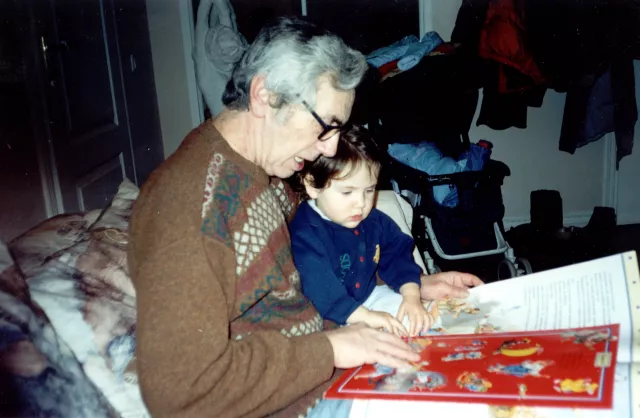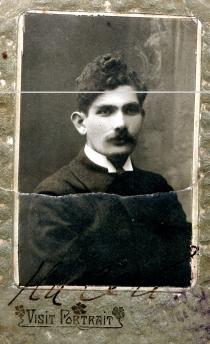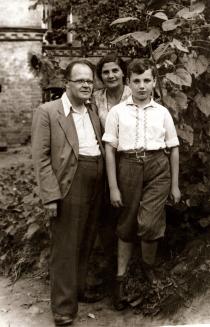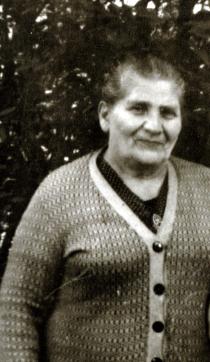Lev Drobyazko, with granddaughter Yevgenia Drobyazko.
Me, Lev Drobyazko, with my granddaughter Yevgenia Drobyazko, who is three and a half years old. The photo was taken in 1999 in Kiev.
My name is Lev Yevgenyevich Drobyazko, and I was born in May 1937 in Moscow. Soon after my birth, my parents moved to Kiev. And here I lived all of my life, with the exception of three years in evacuation. The history of my name has nothing in common with any Jewish traditions, but nonetheless, it is interesting. My parents, especially my father, admired the 'leftist front' in literature and art, and that is why they wanted to name me Lef. Fortunately, the clerks who registered my name knew nothing about my parents' intentions and registered me with the traditional name of Lev. And I like it.
In order to avoid army service, I tried to find a job in military or paramilitary organizations, but nobody wanted to take me due to the 'bad' last name of my
mother, which showed that I was Jewish. Due to the common efforts of our relatives and friends, such a job was finally found, and a few years later the problem of my army service was no longer relevant, because my parents retired on pension and I was their only provider. This is when I finally got real work at the Academy of Architecture and began to prepare for an institute. I entered the Construction Institute in 1960 at the age of 23. At that time I was already married and had a young son. So, naturally, I could study only at evening classes, combining work and studies. Nevertheless, I was so eager to study that I graduated from the Institute with honors.
I married at the age of 22. I met my future wife, Nelya Aronovna Kantorovich, at a Komsomol meeting at the Academy of Architecture. She was not even 20 at the time. However, our parents, both hers and mine, received positively the news of our desire to marry so early.
But we had no place to stay. First, we rented two small rooms in Klovsky Street, then at our house, from writer Riva Balyasnaya, who returned from the GULAG in 1962 just as many other residents of our writers' house had. In the 1950s people were arrested from every family that lived in that house. By the beginning of the 1960s, all those who survived the camps and prisons, returned. There were not many. I remember only three Jewish families who returned.
In the 1990s, the priorities of my plans, as well as the plans of my wife, were gradually moving towards our son, his interests and abilities. He finished his studies at the sports boarding school and then at the Institute of Physical Culture. For some time he was involved in big sports (boat-racing), but had to quit for health reasons. For a while he had no work and was very down morally. We were fearful for his future, but strange as it may sound, it was the army service that I once tried to avoid that helped him get up on his feet again. So, our son found his calling in the army service as a paramedic. Genetics is a great thing! In the army he worked in different offices as a paramedic. I believe this is what he really liked in life. But he refused to study at the Medical Institute and instead entered the modern business world. His national and social orientation was moving constantly towards his Jewishness, and now his friends are mostly Jewish. I don't exclude the possibility that this was caused by former complexes and offences he experienced as a child. Even now he wears a huge Star of David, given to him as a present by his gentile wife. As far as I know, Alexey fully identifies himself with the Jews, but economically, socially and morally he is rooted in this country, with its difficulties and problems. Obviously, his view of this country's future is more optimistic than mine.
Very recently I started thinking that maybe he is right. It happened on Hanukkah in December 2001, while I was listening to my 4-year-old granddaughter Zhenya, Alexey's daughter, reading a poem in Yiddish. First, her parents (her Jewish father and her gentile mother) brought her to the artistic reading studio, and now my wife and I, her Jewish grandparents, are taking her there. We are doing our best to inspire a love of reading in her, so that she may inherit our library.
Our current activities are now very important to my wife and me. After retiring on pension four years ago, we joined the Jewish Studies Institute. I am now working on a history of Jewish writers in Ukraine, while my wife is working on a history of Jewish theaters.





















